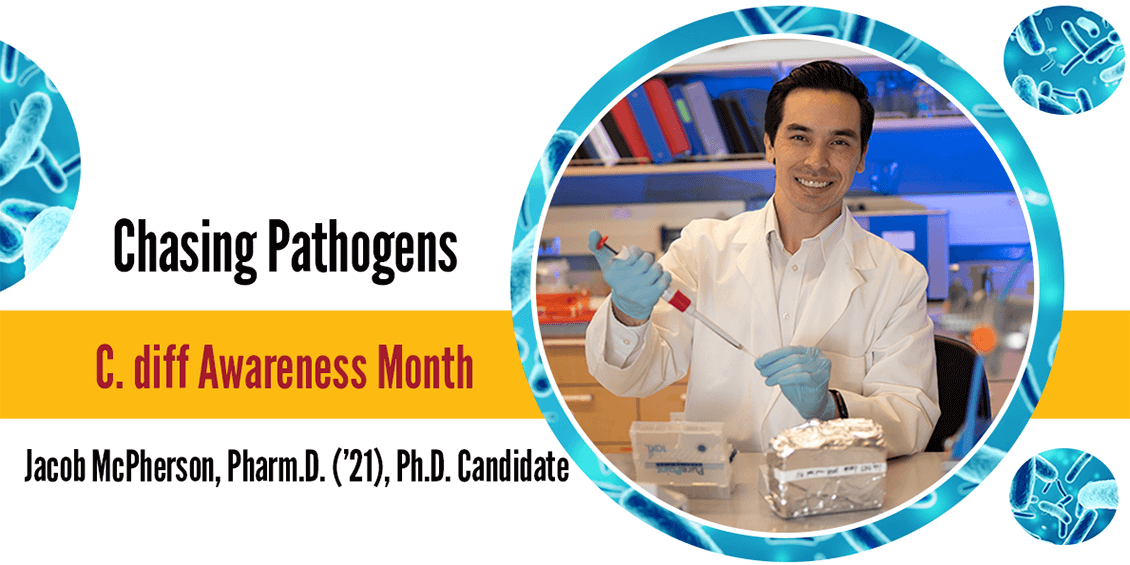The thrill of the chase and the COVID-19 pandemic's toll marked a sea change in the career aspirations of UHCOP Pharm.D. alumnus Jacob McPherson, who is now investigating antibiotic agent and resistance mechanisms as part of his Ph.D. studies.
McPherson, Pharm.D. (’21), is a current Ph.D. candidate in the Department of Pharmacy Practice and Translational Research. Earlier this year, McPherson was selected for the Gulf Coast Consortia Texas Medical Center T32 Postdoctoral Program in Antimicrobial Resistance. The fellowship, funded by the National Institute of Allergy and Infectious Diseases, is supporting McPherson’s research into a novel antibiotic, ibezapolstat (IBZ), for the treatment of Clostridioides difficile (C. diff) infection (CDI) and the resistance of IBZ on commensal microbiota (i.e., the wide range of microorganisms that inhabit our bodies).
With approximately 500,000 cases reported each year resulting in nearly 30,000 deaths annually, C. diff infection (CDI) is the most common health care-acquired infection in the U.S., according to the National Institutes of Health. With limited treatment options and C. diff’s ever-growing resistance to antibiotics, it is critical to find additional avenues for treating this deadly infection.
McPherson’s research has brought about some interesting findings and even more interesting questions, such as why other non-toxic gut bacteria from the same broader species as C. diff got a boost when exposed to IBZ.
"We initially anticipated IBZ to be a microbiome-sparing antibiotic that selectively targets C. diff," McPherson said. "However, in translational studies of IBZ, we found that certain beneficial bacteria within the same species as C. diff that comprise up to 40% of the human gut microbiome increased in abundance in CDI patients treated with IBZ. My dissertation focus is researching what structural and kinetic features differ between IBZ’s interaction with the beneficial bacteria versus IBZ’s interaction with C. diff."
Spend one moment with McPherson and his enthusiasm for the field is contagious.
"My research passion for infectious diseases stems from its inherent translational nature: the study of pathogens often includes wet-lab microbiology and data capture from patient charts," McPherson said. "I think my scientific itch comes from the continuous evolution of the challenge: the antibiotic resistance 'arms race' keeps me learning new mechanisms of resistance, new antibiotics and new ways to treat patients. While many see a challenge, I see these as learning opportunities on how to best address infectious diseases that have scourged mankind for millions of years to even just recent introduction."
His passion for translational research and the COVID-19 pandemic are what led McPherson to pursue his Ph.D. concurrent to his Pharm.D.
"The pandemic taught me that Pharm.D./Ph.D.-trained individuals could bring a synergy to the healthcare system and further science," McPherson said. "Pharmacy students learn the breadth of patient care while Ph.D. graduate students learn how to uncover depth of knowledge in a particular topic. There are knowledge gaps in both parties that a dual-trained clinician-scientist is equipped to address."
McPherson studies under the mentorship of Kevin Garey, Pharm.D., M.S., FASHP, FIDSA, FCCP, Robert L. Boblitt Endowed Professor of Drug Discovery. With his Ph.D. studies nearing completion, McPherson said he plans to pursue a career in academia.
